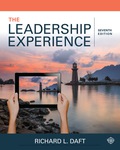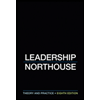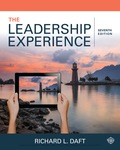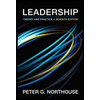
EBK THE LEADERSHIP EXPERIENCE
7th Edition
ISBN: 9781337516020
Author: DAFT
Publisher: YUZU
expand_more
expand_more
format_list_bulleted
Question
error_outline
This textbook solution is under construction.
Students have asked these similar questions
How in an organization individual characteristics of a leadership and organizational culture impact their ability to make ethical decisions? Justify your answer with examples. give detailed and long answer
How in an organization individual characteristics of a leadership and organizational culture impact their ability to make ethical decisions? Justify your answer with examples. give detailed answer
Do you believe leaders in large Fortune 500 companies follow and model their stated visions, missions, and values in everyday business dealings? Explain. Identify a Fortune 500 company and CEO in the news that demonstrates ethical behavior. Is there any evidence that his or her company’s performance is related to ethical leadership behavior? Explain.
Knowledge Booster
Similar questions
- How should a leader approach employees with an unpopular or even hated policy that he determines MUST be implemented?arrow_forwardWhat steps can leaders take to continually enhance their own ethical decision-making skills and capabilities?arrow_forwardTaylor is the CEO of a large company and in her role she thinks it is important to meet with people in the community. She attended a meeting with community leaders spent time informally answering their questions about the company. When she answered those questions, which managerial role was Taylor playing? Multiple Choice consumerism resource allocator leadership figurehead monitor entrepreneurarrow_forward
- Leadership Position Paper Please develop a 3-page leadership position paper which includes your present philosophy and perspectives on effective leadership, followership, and organizational performance. I recommend that you use these 3 areas as headings in your paper to ensure that you cover the topic effectively. Include examples of YOUR leadership, follower effectiveness in your response. Workplace/organizational examples are recommended as well. This paper may be written in first person with/without citations.arrow_forwardHow do you think leaders can maintain ethical standards during challenging times, such as economic downturns or crises?arrow_forwardFrom the "Top 10 Skills an Effective Leader Should Have", Pick Three(3) from the list that you think you currently have as a candidate for an effective leader.Explain each or relate each of them to you from the experiences you had and how are they helpful and effective to you as a good and effective leader in the future.Then in the last paragraph, what advices can you give to others if they are not believing in themselves or feel like they don't have what it takes to become an effective leader?arrow_forward
- Effective management also involves the cultivation of strong leadership skills, as leaders play a critical role in shaping organizational culture, inspiring teams, and driving change. Leadership encompasses the ability to articulate a compelling vision, align individual and organizational goals, and motivate others to achieve excellence. Whether it's leading by example, providing mentorship and support, or fostering a culture of trust and collaboration, effective leaders create environments where employees feel valued, empowered, and motivated to contribute their best. Moreover, leadership extends beyond formal authority and titles, as anyone within an organization can demonstrate leadership qualities through their actions and influence. In today's dynamic and interconnected world, leadership is increasingly about agility, resilience, and adaptability in the face of uncertainty and change. Leaders must be able to navigate complexity, anticipate emerging trends, and inspire innovation…arrow_forwardThere are five primary types of leadership: Transformational, Authoritarian, Delegative, Transactional, and Participative. In your initial post: Explain your leadership style. Which of the five primary types of leadership most closely aligns with your style? Why did you pick that style? Why is it the best leadership style for the sector of the economy you choose to work in? (This can either be with your current job or the job you plan to work in after you graduate.) Should leaders change their leadership style to adapt to different circumstances? Why or why not?arrow_forwardWhy should leaders be willing to challenge expertsWhy should leaders be willing to challenge authority figuresarrow_forward
- As a business leader over the course of your career you will establish patterns of behavior that determine what's capable and what's not within your organization. Create a Code of Ethics for your organization that explains acceptable behavior towards employees, customers, and suppliers. Your Code of Ethics could be a list of guidelines that explains everyone's responsibilities within the organization, or statements of goals for everyone in the organization to meet or exceed, or policies that must be followed to promote ethical behavior from everyone in the organization.arrow_forwardLeadership is a multifaceted concept that encompasses various skills and attributes essential for guiding individuals or groups towards a common goal. Effective leadership involves inspiring and motivating others, setting a clear vision, and providing direction and support to achieve objectives. Furthermore, strong leadership requires excellent communication skills, empathy, and the ability to make tough decisions under pressure. It also involves fostering a culture of trust, accountability, and collaboration within the team or organization. Additionally, effective leaders lead by example, demonstrating integrity, resilience, and adaptability in the face of challenges. By empowering and developing their team members, leaders can cultivate a sense of ownership and commitment, driving performance and fostering innovation. Question: What are some key strategies that leaders can employ to cultivate a positive and inclusive work environment that encourages creativity, collaboration, and…arrow_forwardLeadership styles in management play a pivotal role in shaping organizational culture, employee motivation, and overall success. Different leadership styles include autocratic, democratic, lalssez-faire, transformational, transactional, and servant leadership. Autocratic leaders make decisions independently without consulting others, often relying on authority and control. Democratic leaders involve team members in the decision-making process, encouraging collaboration and participation. Laissez-faire leaders provide minimal guldance, allowing employees to make their own decisions and manage their tasks independently. Transformational leaders Inspire and motivate followers by setting a compelling vision and empowering them to achieve it. Transactional leaders focus on rewarding desired behaviors and correcting deviations through Incentives and penalties. Servant leaders prioritize the needs of others, emphasizing empathy, stewardship, and ethical behavior. Effective leadership entails…arrow_forward
arrow_back_ios
SEE MORE QUESTIONS
arrow_forward_ios
Recommended textbooks for you
 Leadership: Theory and PracticeLeadershipISBN:9781506362311Author:Peter G. NorthousePublisher:SAGE Publications, Inc
Leadership: Theory and PracticeLeadershipISBN:9781506362311Author:Peter G. NorthousePublisher:SAGE Publications, Inc
 Leadership: Theory and Practice, 7th EditionLeadershipISBN:9781483317533Author:Peter G. NorthousePublisher:SAGE Publications, Inc
Leadership: Theory and Practice, 7th EditionLeadershipISBN:9781483317533Author:Peter G. NorthousePublisher:SAGE Publications, Inc

Leadership: Theory and Practice
Leadership
ISBN:9781506362311
Author:Peter G. Northouse
Publisher:SAGE Publications, Inc


Leadership: Theory and Practice, 7th Edition
Leadership
ISBN:9781483317533
Author:Peter G. Northouse
Publisher:SAGE Publications, Inc